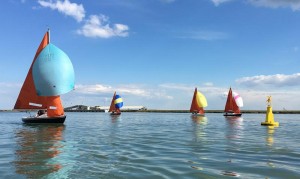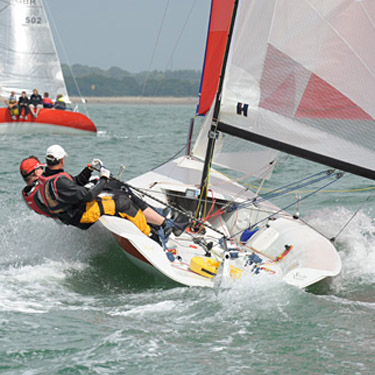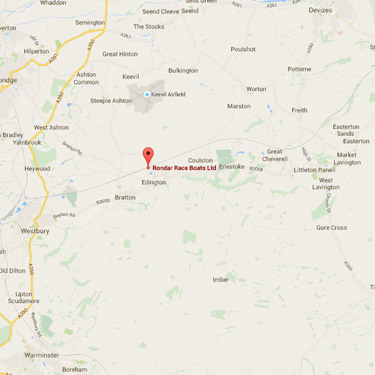
Photo by Hyde Sails
The results on the water have been almost identical as last year with wins in almost all the events sailed.
The Oulton Broad Open was a very light and flukey affair, where boatspeed was one of the least important determinants of success! However we won fairly comfortably, but largely through winning the starts more often than not. We had decided to sail the grey boat 881 which we acquired a couple of years ago after Petticrows, the Dragon and Finn (and one of the prospective Squib!) builder had taken it in part exchange from Mike Budd after he had used it to win the Nationals in Abersoch.
Using this boat (now named ReHyderated) has been a difficult decision. Our other boat 105, has a fabulous record and has never let us down in respect of speed. Certainly in strong breezes we have felt unstoppable in her. We won the breezy race at last years nationals by a long way after leading from start to finish, she has always gone well downwind and is fitted out in a fairly complex but easy to use way which has been tailored to our sailing style and techniques.
However the keel has always rusted around the hull joint and we have got a bit sick of sanding the keel down for every event only to see the rust seeping through when hauled out a few days later. We know the only real solution is to remove the keel and shot blast and epoxy it… but with limited time available we kept looking at 881’s perfect hull and keel finish and succumbed to the temptation to swap ships. The only problem was that when we had used 881 for three events previously she had been slow!
We therefore decided we would rig her exactly as our tuning partner Malcolm Hutchings boat 819. Lady Penelope. Previously owned by back in 2000 and sailed by Nigel andSophie Haigh at the Weymouth Nationals to 6th place, Lady P has always gone well. Malcolm and Andy have had a lot of good results in her and have won the Inlandsand nearly won the Nationals as well as lots of other events. Malcolm can also be credited with the currently fashionable “lower barber hauler position” as well as sailing with more rig tension than most. They have had blistering pace in medium conditions with good acceleration and seem to be powered up quicker than most. Both attributes consistent with a more rigid rig and more powerful jib set-up.
We used 881 for the testing session with the new Rondar boat at Bradwell in December, where she was always quicker than the Rondar boat. But of course the question was she quick or was the Rondar boat just slow was left hanging. With hindsight we would have been better using Lady P to test the Rondar boat, that way the variable would only have been the performance of the Rondar boat (and the golden rule of any two boat testing is to only change one thing at a time!) The Rondar boat also had a very dodgy keel fitted (which by bizarre chance came from an old boat Jack had found on Ebay, we bought it as a “mule” for various development projects, then donated it to a sailing charity at Levington, where they took the keel off to use the boat for static training for the blind… the keel then ended up via Salty on the Rondar boat. Complete with the holes we had drilled through it to measure the thickness!)
So with a low performance keel on the Rondar boat and a higher mast step because of the self draining floor, we could see the Rondar boat could be made to go much faster in full production mode, especially with the rig refined to take account of the extra stiffness that was so obvious on the testing. But it left is none the wiser on the performance of 881 compared to our trusty 105.
So back to the results at Oulton Broad. Stuart Rix in Aquabat ran a consistent second and the Rondar boat sailed every well by Tim Riley came 4th but won a race… However our post event analysis suggested that we were never going too quick. Our result was more about boat handling and shifts than outright pace. We had also changed our mast too. The old Superspar on 105 had done a lot of miles. 881 came with a Z spar which we feel is too stiff and does not have the gust response of the SS. The new SS was stiffer than the old when we bend tested it (despite being the same spec!) but more bendy than the Z.
We had decided last year to recognise these different bend characteristics by offering two mainsail designs – 315s and 315z for the two masts. The s having slightly more luff curve than the z.
We sailed at Oulton with a z mainsail to see how it worked on our unexpectedly stiffer Superspar mast. The conclusion was that we were unsure!
So come the next event, Jack’s new fleet open at Mersea, we decided to stick with the 315 z mainsail and hope for enlightenment. With Jack sailing his own (old and unfashionable and theoretically ‘slow’) boat to victory in race one and 4th overall and Ian Keely and I lumbering around the course in mid fleet and securing our worst result in an event for years we had a shock on day one! Jack’s boat had (effectively) the rig and rudder off 105 and he certainly did not lack pace. 881 in comparison was dog slow…..why?
Day 2 of the Mersea event was a seperate race “around the cans” and Ian and I in 881 won it easily. After a tussle on the first two legs with Jack we pulled out a big lead and although caught up on the penultimate leg by Nick Tolhurst and Mel Titmus, who planed up to our transom on a big gust, we felt pretty happy with our boat speed.
The conclusion was that we had pushed the”tight rigging” concept too far. The jib was then too flat with too fine and entry. That made the boat unresponsive to gusts and just too difficult to sail. Was the mainsail perhaps too flat with the Superspar mast?
Onto the Gold Cup to find out!
Sailing at Burnham is a niche branch of the sport. Local knowledge of tides and depths plays a big part. The RCYC fleet is getting hotter and hotter and some now say represents the best in the country (except at Abersoch of course!) An 8 race event with two discards provides a real test of Squib sailing skills on windward/leeward courses.
With a much slacker rig set-up we were leading at the end of three races on day one and showing good pace in bursts, but the conditions were the shiftiest and flukiest we had ever sailed at in Burnham. Big differences in pressure and wind direction just a few yards away on day one gave no real clue about speed. The short courses and tide meant that starts usually had only one place to be. So we felt “lucky” to be winning going into day 2.
The five races on day 2 were in steadier, but still light conditions. What was apparent was that several boats had the pace to win if they won the start. Malcolm and Andy in Lady P won the first two races on day one, but could only manage best places of two 2nds on day 2. With an ambitious and OCS attempt at a port tack start in race 6 they could still have won with the second discard coming in if all 8 races were run.
Visitors Rolly Wilson in Bacchante II with Martin Harrison helming were always going really well. They won one race (literally by inches from us who just failed to overhaul them on the short spinnaker leg to the finish) and nearly won a couple of others. Martin was left reflecting on the difference in performance between his (heavy) boat 500 and the top -speed Bacchante – and also felt it highlighted the threat to the class of the potentially faster Rondar boat. To us it seems that none of the “old” pre- 165 boats, goes any faster than Bacchante. Rolly is a thoughtful and scientific sailor whose approach to speed (and tactics) is thorough and effective. Whoever he sails with at the nationals the Bacchante team are ones to watch. Their 3rd place overall was well deserved and possibly even a little harsh.
Micky Wright sailing 811 Spoof with Alex Porteous was 4th overall and won a race. His laid back approach suited the stressfull nature of the conditions and he always seemed in the hunt. His sails were not the latest Hyde designs and (dare we say it) it is possible there is more potential speed there with new sails from the latest cloth.
Robert Coyle and Mark Irwinski in 823 Humphrey was denied a probable win (as was Phil Aspinall and Howard Enkel in 72 Guy Fawkes) through course error on the outer loop trapezoid courses….but both these teams have great and consistent speed. Phil and Howie are often at the front these days and whereas they used to be seen as fast in the lighter conditions, they now seem to be quick across the range. Phil seems to be learning all the time what makes a Squib go well. There has to be an expectation that Robert will do well at Weymouth and Phil could spring a surprise.
The Rondar boat sailed by Squib dynasty member Jamie Mears, more normally seen at the very top of the 18 foot Skiff fleet, showed impressive starting skills (as was expected) and won a race after winning the start….he was often in the hunt, but probably lacked time in the boat. To get sailors like him in the class, just like at the Mersea open Lee Childs(OK National champ) stepped in for a guest appearance shows that the Squib has the appeal for good sailors… and raises the question of how the class attracts them. Jamieseemed to be less than enthused by the Rondar boat as the solution to that question!
Nick Tolhurst didn’t follow up his Mersea form with a comparable result but goes quick. Duncan Grindley and Simon Griffin both had their moments, Simon very nearly winning a race.
Stone SC sailor Neil Fulcher had his frustrations with Burnham sailing but on a couple of occasions won the start (as he regularly seem to do) and had good first half to a couple of races.
We had three firsts and three seconds, discarding two fourths. So we were winners relatively comfortably (in fact, like last year with Ian Keely crewing) we won with a race to spare. It was hard to say that we lacked speed. In fact we were buried several times but were able to extricate ourselves from mid fleet which was never easy. Conditions were exactly those that we would have thought were ones where we were vulnerable and yet at times we seemed to have speed to burn.
So we go to the Easterns with still some ideas on how to get more speed, but confident in 881 now. We want to experiment a bit more on setting the boat up in a way than enables us to change gear more quickly and easily. Top speed in a Squib (like all boats) is only achieved by adjusting sails, rig and technique to the variations in wind strength and wave height encountered in a race. At Burnham and Mersea the pressure differences were such that what was fast at one end of the course could be slow at the other. Also the tactical requirements between going low and fast or needing to squeeze into high mode only can be achieved if all the controls work well from both sides of the boat, sat in and hiking.
The variable of rig set-up is compromised by the rules that do not allow the standing rigging to be adjusted during racing and the unrestricted swinging spreaders. Which means you need to be on the right settings before the start and to be able to change easily in between races. We use fast pins on the shrouds and are experimenting with moving the height of the jib tack (like on an SB20) to adjust jib leach tension, rather than moving the jib sheets from the old “high” position to the “new” lower position.
We have also set our pole to launch from the starboard side to better facilitate a quick first hoist. There are clear benefits at the windward mark, but takes getting used to…Do we also stick with the 315z mainsail?
Can we fully evaluate these changes before and at Weymouth? We will see at Medway… at least we have some time to consider them because that hull and keel still look perfect!















